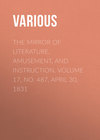Loe raamatut: «Belford's Magazine, Vol. II, No. 3, February 1889», lehekülg 15
XIX.
THE MAD AVENGER
Nobody could devote himself with greater assiduity to an almost hopeless task than Lem Pawlett did to his pursuit of the unknown lawyer. The weather was exceedingly hot in the city, and he, accustomed to breathing the pure fresh breezes of the sea-shore, felt it terribly oppressive. The pavements were very hard to his feet, used to the soft earth and sand of the country, and he was actually lame most of the time. The interminable streets and the multitude of people confused him and gave him a horrible sense of isolation among them all. Then he very much missed little Ruth's affectionate despotism, and her practical good sense and encouragement, for he had so many disappointments and discouragements to encounter that he was fairly heart-sick almost all the while. Still the good fellow did not give up his chase. He had come to town for a purpose, he said to himself, and he would succeed in it or die trying. Day after day he haunted the courts and the streets where there were most lawyer's offices, and it was not long before he became actually a terror to all the little elderly gentlemen who practised law in New York – and there were a great many of them, as there are even yet. Seeing one who, it seemed to him, might come within the somewhat wide specifications he alone had for his guidance, of being small and past middle age, it was his habit to buttonhole the suspected person and put to him directly the question:
"Do you know the Van Deusts of Easthampton?"
They all said "No." A very few of them, at first, had curiosity enough to add "why?" But upon his commencing his story which from his manner promised to be long, they would always exclaim, "Ah! One moment – excuse me. I see a man – " and would dart away. Generally they did not even ask "why?" but darted away about their own business all the same.
His frequent repetitions of the same question were overheard by other members of the bar than those to whom it was addressed, and it was observed that the interrogation was always directed to little, elderly gentlemen. So very speedily it became a stock-joke among the profession for waggish counsellors to ask of his selected class of victims, at the most inopportune times and unexpected places, "Do you know the Van Deusts of Easthampton?" until they were almost maddened by the iteration.
One jocose attorney christened Lem "The Mad Avenger," and by that title he was soon generally known. The poor fellow was much puzzled to account for the hilarity that his appearance in court sometimes seemed to occasion; for the general interest that appeared to be awakened among the lawyers when he approached one of whom he thought he should ask his question; and for the angry haste with which the person so approached would reply, oft-times before he said more than "Do you – " with an emphatic "No. Never heard of them in my life." Sometimes he asked the same person, twice or thrice even, on different days, for he could not be expected to remember them all.
There are always haunting the courts a few poor, harmless mad people, – wrecks whose hearts and minds have been at some time crushed by the Juggernaut of the law. The mercy of forgetfulness has wiped away the memory of ruinous defeat and made place for ever-springing hope in their breasts. They imagine always that their cases are "coming on very soon – to-morrow, perhaps;" for the bitter, heart-sickening lesson of legal procrastination is deepest graven, and survives all else in their blighted brains. Lem got to be regarded as one of those unfortunate beings. And then, even if he had got an opportunity to tell his story to anybody, the chances are that it would have been taken for a fiction of his imagination. Still he plodded on indefatigably, with his eyes always open for the wanted witness, and his one question ever trembling on his lips. His manner of operation was certainly not the best, – not the one that a skilful detective would have adopted, – but it was the best he knew; and sooner or later Providence is pretty certain to help those who endeavor for themselves as earnestly and well as they know how.
Once only he sought to make a divergence from the path upon which he had set out. He went to the police, thinking to ask their aid. The superintendent received him brusquely, demanding as soon as he put his foot over the threshold of the office: —
"Well, my man, what do you want?"
"I have come, sir, to ask some help here in finding out about the murder of Jacob Van Deust, of Easthampton, Long Island."
The superintendent referred to a book at his elbow, and replied curtly, "Man on that case now."
"Yes, I know there is," answered Lem, "but it seems to me that he's on the wrong tack, and – "
The superintendent did not trouble himself to hide his contempt for the criticism of an unprofessional, and a countryman at that, upon one of his force of detectives, and interrupted with the abrupt retort:
"Very probably. But I guess you are not likely to teach him his business. Martin!" – turning to his messenger – "Tell the captain I'll see him now."
Lem accepted this discourteous dismissal, and found his way into the street without anybody seeming to have noticed that he said, "Good-day, sir."
Singularly enough as it might appear, in view of the notoriety that Lem's question had obtained among the lawyers, but for a very excellent reason, nevertheless, the one man of all of them who could have responded "yes;" the one man of whom he was in search, had not in all this time heard that anybody was hunting an acquaintance of the Van Deusts and, though he was the only person in New York who had any direct business interest in the Van Deusts, knew anything about them or would have been likely to know of any important event happening to them, he had not even heard that Jacob Van Deust had been murdered. That one man was Mr. Pelatiah Holden. Of late years he had practiced very little in the courts. He had amassed a considerable fortune – one so regarded in those days, at least – by the exercise of his profession; and as he grew older and attained a high and deserved reputation by his ability, gradually drifted into the comparatively quiet, easy, and lucrative life of an office lawyer – one who gives counsel to other lawyers in difficult and important cases. His deep learning in the law, his wide knowledge of rulings and precedents, and his great caution in forming and framing opinions, gave weight and value to his advice, and put him in the position of a general who plans battles for others to fight, but seldom finds himself directly engaged in combat.
It was his custom to go to his office at an early hour every week-day morning; lock himself in a little inner room, the walls of which were covered with a magnificent legal library; receive there only persons who came on such important business as could not be attended to by Mr. Anderson, his old and able confidential clerk; have a lunch handed into him at noon precisely; and, at four o'clock to leave for his home somewhere in the upper part of the city. During his seclusion in that inner room, he was constantly busy, poring over law books, reading points submitted by counsel, and writing opinions. When a person was admitted to see him, the very atmosphere by which he was surrounded, was a warning against waste of time in idle conversation. Not one, of even his most intimate friends, would have dreamed of taking up his time with mention of a new lunatic haunting the courts.
So it was that Lem met him and passed him by in the street, unconsciously, over and over again, not even knowing that he was a lawyer. The young man was so uneasy, restless and unhappy, as the days flew rapidly by, and the time for Dorn's trial was drawing nearer – for the grand jury had found an indictment against him within a week after his commitment by the magistrate, and he was to be tried for his life at the next session of the court – that he could no more sleep at night than rest in the daytime, and was almost constantly strolling aimlessly about the streets, growing thinner, more careworn and despondent daily.
One evening, as he was passing the front of the old Chatham Street theatre, he was surprised to hear himself called by name, and turning, found himself face to face with Silas Thatcher. He had not seen the scapegrace for more than three years, had never been at all intimate with him, and hardly recognized him now, so greatly had his appearance changed. Silas was dressed in black cloth, wore a silk hat, flashing breast-pin and shining boots, had a moustache and goatee, and was smoking a long cigar. In all respects he was a good sample of the lot of a dozen or more fellows lounging near the theatre door, every one of whom was known to the police as a gambler or a thief, and most of them as deserving official notice in both characters. The vulgar affectation with which he sought to impress his rustic acquaintance, did not lacquer over the coarse blackguardism of his customary manners, and Lem, without well knowing why, felt an instinctive dislike for, and distrust of, him. Still, he stood and talked a little while, telling the last news he had from home; that Uncle and Aunt Thatcher and Mary were all well; that Eben Stebbins had gone a-whaling; that the schooner "Pretty Polly," with Captain Marsh and three men, had been lost in a gale; that Dorn Hackett had come back and been arrested on suspicion of having murdered Jacob Van Deust —
"Murdered old Jake Van Deust! You don't mean to say that you folks down in that dead-alive little village, have had the sensation of a real murder!"
"Ah! yes. A terrible sensation, too, the killing and robbery of a poor, weak, old man, and the arrest of an innocent person for the crime."
"Let's go and get a drink, while you tell me all about it."
"No, thank you. I don't drink. But I can tell you all about it here, all the same." And he told the whole story, at least, as far as it was known to the public, instinctively suppressing, however, all mention of the evidence he hoped to find in the city.
"That handkerchief business will be likely to hang him, won't it?" asked Silas.
"It seems very serious to his friends."
"Mighty queer that he should have had the thing! – if he isn't guilty."
"And yet I am as sure as that I am alive this moment, that if they hang Dorn Hackett for that murder, they will hang an innocent man for the crime of another."
"Come, let's go and take a drink, just one. Take something light if you like. And then we'll go around and see some life. Come on. I want a drink."
"No, you'll have to excuse me, Silas. I never drink, and I feel pretty tired; and, I think I'll go to bed."
"Go to bed! now! Why, a man isn't a hen. Night is the only time to see life in New York. I've only been up a couple of hours or so. Come along, and I'll show you the elephant."
"No, thank you. I have no desire to see him. I'd rather go to bed. Good-night."
"Well, good-night, – if you will go."
Silas, when left alone, hastily entered the bar-room attached to the theatre, and called for a glass of brandy. While he was pouring out the fiery beverage, an acquaintance entered, and, looking at him with surprise, exclaimed: —
"Why, Sile! What the deuce is the matter with you? You look as if you'd seen a ghost!"
"Maybe I have. What'll you take?" answered Silas, dryly.
"Brandy," replied his friend, and the young man's looks were no more commented on.
XX.
RUTH'S LETTER
When Lem reached the humble hotel on Pearl Street, at which he put up, he found a letter addressed to him in the clerk's rack. It had arrived while he was out that afternoon. No need for him to open it to know who it came from. One glance at the superscription was enough for him to see that Ruth's chubby little hand had guided the pen. Retiring to his little room he opened the missive, trimmed his solitary candle, and with a countenance of happy anticipation sat himself down to read.
"Dear old Lem," she wrote, "I'm beginning to think that you are away an awful long time, and I'm getting real anxious about you sometimes. Perhaps you have found some handsome city lady that you think you like ever so much better than me, and have no idea of coming back to the village. If so, just mention the fact while I have some chance left. I hear that Deacon Harkins is looking out for a fourth wife, and who knows – But there, I won't plague you any more, you big, good-hearted, stupid dear. I know you won't fall in love with anybody but your little Ruth, any more than she will with somebody else than her big Lem, and I can answer for her. But there! I haven't much time to write about you and I, for I've got something real serious to tell you, something that may be a great deal of help to you in what you are trying to do; that is, supposing you are trying what you started for, and not just to capture the handsome city lady. Mary has been to see Dorn in jail, and had a talk with him about the little elderly gentleman, and he has remembered something more than he told you that makes us both sure we have seen him, and would know him again; and it's a wonder to me that he didn't think of telling you, for he's a man you couldn't mistake. But then you men are all so flighty and slow to think about things, and you never get them right until a woman takes them in hand."
Lem scratched his head, looked perplexed, reread the long sentence, and then muttered to himself:
"Ah, yes! I see. Dorn has remembered something more – and it's the little elderly gentleman she and Mary have seen – and it's a wonder Dorn didn't think of telling me that something he has remembered – and the little elderly gentleman is a man I couldn't mistake. Yes, it's all clear now." And he read on:
"I remember him just as well as if I saw him only yesterday, and I'll tell you exactly how he looked. He wore a wig, very dark brown, nearly black, and very neatly brushed; and he had a shirt bosom with a frill – like those queer old heroes of the revolution in our pictorial book of American History; and his tall silk hat had a very wide crape around it; and he had a funny little breast-pin in his frill that looked like a square of glass with gray hair under it, and little pearls around it, like grandmother's brooch. He had on a stock, a very wide, stiff stock, that kept his head up very straight; and when he bowed he moved as if he was only hinged in the middle. He spoke very deliberately, and seemed to be afraid somebody would snap him up right off if he didn't say exactly the right word, and he appeared to be too cautious ever to say anything positive. He spoke of the Van Deusts as 'supposed to be brothers,' and when Dorn asked him what time it was, he looked at his watch and replied that, 'according to his information and belief it was eleven minutes past ten.'"
"Now I'm sure, Lem, that such peculiarities as his must mark him out; so that when you know them you will have little difficulty in finding him. Do your best, darling, and make haste, for the time is getting terribly short for poor Dorn and dear Mary, – and yet it seems awful long to
"Your own little"Ruth."
"This is serious. This merits consideration and dissection," said Lem to himself, spreading the letter on the table before him, and squaring himself to go at it as a study. It was nearly morning when he felt that he had fully mastered all its contents, and threw himself on his bed for a short and troubled sleep.
But the earliest lawyers on the street – those who snatch a subsistence from the dregs and scum of humanity thrown up daily by the currents of misfortune and vice, upon the strands of the police courts – saw "the Mad Avenger" already prowling about the vicinity of their offices long before the hour at which the civil and principal criminal courts would be opened for business. When the judicial mills commenced their grinding, he was within sound of their clatter, and from one to another he wandered, anxiously and wearily, as was his custom. When the day's grist was completed, and the grinders hurried away to their respective offices to prepare more grain for the morrow's grinding, he mechanically followed them.
It was getting late in the afternoon; he had not yet seen anybody approximating to the picture he had in his mind's eye – the portrait drawn by Ruth – and he was just arrived at that period of the day when he always felt most sick with disappointment, and most sorely tempted to give up the seemingly useless pursuit and go home. He stopped before the little hand-cart of a street fruit vender, which was drawn up to the curbstone, to buy an apple. While he made the purchase he heard the voice of a man, who halted just behind him, saying quickly:
"Ah! I was just coming up to see you. Are you in Fordyce vs. Baxter?"
"Not having been advised by my clerk," said a precise and deliberate speaker in reply, "that any papers in an action so entitled had been deposited in his hands, and having no other knowledge of such action than your present mention of its title, I believe that I am justified in saying, sir, that to the best of my information and belief – "
"Aha!" shouted Lem, wheeling around and seeing before him the living original of Ruth's very exact sketch – "You're the man I'm looking for!"
"What the – the – the – mischief do you mean, sir," exclaimed the little gentleman, warding off the hand that Lem stretched out to clutch his collar.
"It's the Mad Avenger," said, laughingly, the gentleman interested in Fordyce vs. Baxter. "He will ask you, in a moment, if you know the Van Deusts of Easthampton."
"Of course I will," retorted Lem, growing hot and angry, "I don't know why you call me the Mad Avenger – my name is Lemuel Pawlett, and I do want to know, for very serious reasons, if this gentleman is acquainted with the Van Deusts of Easthampton."
"And I reply that I am," answered Mr. Holden, sufficiently perturbed by the immediate excitement to forget his customary caution and make a positive statement without qualification.
"Oh! The deuce you are! Then there really are Van Deusts of Easthampton!" exclaimed the other lawyer, with genuine surprise and beginning to feel an interest in the affair.
"Thank God! I have found you, sir. Thank God!" ejaculated Lem, fervently, "for I believe you can be the means of saving an innocent man's life."
"Bless my soul!" gasped Mr. Holden – "But, here! This is no place for a consultation. Come up to my office;" and he began elbowing his way through the crowd that had already gathered.
"But are you in Fordyce vs. Baxter?" called after him the gentleman whose lucky inquiry had brought to Lem the good fortune of this meeting.
"No," Mr. Holden answered, still moving off.
"Then remember that you are retained for the plaintiff!"
"See Anderson about it," shouted back the little gentleman, disappearing with Lem in the big doorway of the stairs leading to his office.
It was with profound astonishment and genuine sorrow that the worthy lawyer heard of the murder of Jacob Van Deust, for he had achieved quite a liking for the younger of the two brothers.
"But," said he, "I am tempted to say that it seems to me somewhat strange that I have not been notified of the fact by the surviving brother."
"Old Peter is greatly broken down, sir; more shaken by the loss of his brother than any one would have believed he could be, seeing how hard and selfish he always used to seem."
"Ah!" replied Mr. Holden, meditatively, his eyes resting upon the mourning band of his hat on the table before him. "The rupture of life-long ties gives deep pain. We are such creatures of habit, if nothing more. We miss a face to which we have long been accustomed; a voice that we had thought was only in our ears, when it was in our hearts all the while. When the grave covers that face and there is only silence, or the sadness of its own echoes in the lonely heart, the world is no longer the same – But, there! – Don't talk about it any more. You have not yet told me how I can, as you said in the street, save the life of an innocent man."
"The man arrested for that murder, perpetrated at or about midnight, as is supposed, is the one you found in the road suffering from the consequences of a severe fall, and whom you helped to leave Long Island, in a disabled condition, nearly two hours earlier that night than Mr. Van Deust was killed."
"Ah! If I did not know of what the police are capable, I should be surprised at it."
"You know he is innocent, sir; and I know it, and Ruth, and Mary, his sweetheart; we all know it. But they would hang him if we couldn't prove it."
The reaction from his long sustained anxiety, the present excitement and his joyful emotion over finding the man upon whom he looked as Dorn's saviour, so affected the poor fellow that he cried like a schoolboy.
"Yes," assented Mr. Holden reflectively, "that is practically what the law seems to require sometimes – and it is hardly ever an easy thing to do. But, come, my good fellow! Leave that crying for the girls you mentioned and give me all the facts you possess bearing on the case."
"I – I – can't help it, sir. Don't mind me – I'll be over it directly. I know it's weak, and foolish, – but I've been worked up so, fearing I wouldn't find you in time."
In a few minutes Lem recovered his self-control, and then it took but a very short time for the skilful lawyer to elicit every detail of the progress of Dorn's case. Lem was surprised at seeing him smile when the discovery of the handkerchief, the strongest point against the accused, as it was deemed, was mentioned, but did not dare to ask him why he did so. When the narration was concluded, Mr. Holden asked:
"When is his trial to come off?"
"On Tuesday next, sir."
"Tuesday next. H'm. Prosecution will take up first day; defence not be reached before Wednesday – and this is Thursday – leaves me four days to get through what I have on hand. Oh, Mr. Anderson!"
The door opened noiselessly in response to his loud summons, and the old clerk poked in his head.
"If Mr. Sarcher comes to retain me in Fordyce vs. Baxter, you will decline to take his papers unless he can wait for an opinion until after next week."
"Yes, sir."
"That is all, Mr. Anderson."
"Thank you."
The clerk bowed and retired his head, again carefully closing the door. Mr. Holden turned to Lem and said, cheerily:
"With Heaven's help, young man, we will save your friend's neck."
"Oh! I'm quite satisfied you will, sir, I'm easy in my mind about it, now that I've seen you. Did you know there's a schooner goes to Sag Harbor, Tuesdays and Fridays, starting at five o'clock in the evening from Coenties Slip?"
"Yes, I know. I have taken it before, and will again, God willing, next Tuesday evening. Go home, see your friend and his sweetheart, and cheer them up, especially the girl. Tell them I'll – well, no; on second thoughts, you'd better say nothing about my evidence that you can avoid; – he would tell his counsel who must be, metaphorically speaking, an ass, or he would have kept his client quiet at the preliminary examination – and it might get to the other side. That might do harm. It is always unwise to let your antagonist in law know your weapons."




















